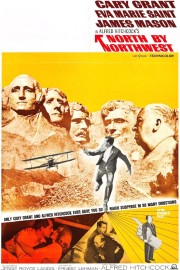North By Northwest
Inspired by meeting Martin Landau, as well as sitting in on a wonderfully informative panel with him, at this year’s Dragon*Con, I decided that it was time to finally review “North By Northwest,” which was Landau’s first major film role. Directed by Alfred Hitchcock at the peak of his powers (right before it, “Vertigo”; right after, “Psycho”), the film is a great mystery thriller that has inspired countless films over the years, but remains the gold-standard in classic star vehicles: imaginative, romantic, exciting, funny, and endlessly entertaining. It’s no wonder why it is my mother’s favorite movie of all-time.
The story goes that Hitchcock and screenwriter Ernest Lehman had been working on an adaptation on a property together, and when that project fell apart, Lehman decided to write “the Hitchcock movie to end all Hitchcock movies,” which resulted in “North By Northwest.” The film stars Cary Grant as Roger Thornhill, a New York ad executive who is mistaken as a CIA agent called George Kaplan by two henchmen for a man going by the name Townsend (actually, Vandamm, played by James Mason). Thornhill is abducted and taken to Townsend; he tries to convince them that he isn’t Kaplan, to no avail. He is then fed alcohol by “Townsend’s” henchmen, led by Leonard (Landau), and left for the police to pick up, leading Thornhill on an adventure to find Kaplan before he finds himself as dead as Lester Townsend, the UN official he is framed for murdering.
In a film of one extraordinary scene after another, the best one comes smack dab in the middle of the film. Thornhill has been given instructions to meet Kaplan by Eve Kendall (Eva Marie Saint), the beautiful woman he has shared a room on a train with. He takes a bus to the middle of a dusty room. He waits, seeing a cropduster off in the distance. A man is dropped off across the street. Thornhill inquires about him. The man points out that the plane is dusting crops where there are none before going off in a bus. Thornhill is alone again, the plane still flying. Next thing he knows, the plane is headed straight in his direction, forcing him to hit the deck. The staging, the writing, and Cary Grant’s performance, turn the scene into a tour de force for Hitchcock. The most extraordinary aspect about it? No music until the plane crashes into a stopped tanker truck, and then Bernard Herrmann’s percussive, rhythmic score kicks in. The next year, Hitchcock tried the same no-music trick on “Psycho” before Herrmann defied him, and the rest is cinematic history. Herrmann’s score for this film is another great one for the composer, from the ingenious opening credits by Saul Bass to the classic romanticism of Herrmann’s theme for Roger and Eve when they flirt shamelessly on the train all the way up to the thrilling chase on Mount Rushmore at the end. Along with Korngold’s score for “The Adventures of Robin Hood” back in 1939, Herrmann’s music here is ground zero for the way modern thrillers are scored. If you don’t believe me, I’ll gladly point to specific cues in this score that have been mirrored in later scores, some of which accomplish the same level of artistry that Herrmann did, others which, well, don’t.
This was the last film in which Hitchcock and Grant worked together (their collaboration also includes “To Catch a Thief,” “Notorious,” and the criminally underrated “Suspicion”), and the film couldn’t have been a better send-off to their working partnership. Grant understands the suave, playboyish Thornhill inside and out, and has just the right blend of ego and humility to pull the role off effortlessly. In particular, the way he sells the early scenes of Thornhill’s anxiety over what’s happening, and especially when he has to drive drunk, and after he is picked up by the police, do we see how Grant was the only logical choice for the role. Rumor has it that James Stewart, Hitch’s other favorite star, was desperate to play the role, but he would have been all wrong: his charm is as more of an everyman, not a ladykiller like Grant was. Hitch played on that aspect of Grant’s appeal in every film they worked on, and here, Grant turns it up to 11, especially when the mysterious Eve (played by Marie Saint in one of the loveliest female roles in all of Hitchcock’s films) comes into the film. Their banter and romantic tension comes off of every frame they share together, and culminates in one of the great, subversive moments in all of Hitchcock when that train goes into the tunnel at the end, and is all important in turning “North By Northwest” into not only one of Hitchcock’s best films (just behind “Vertigo,” “Rebecca,” and “Psycho”), but also the definitive example of the type of thriller Hitch directed so well, and so often, over his long career. Even now, no other director has come close to matching the Master of Suspense’s quiet artistry and droll wit.










